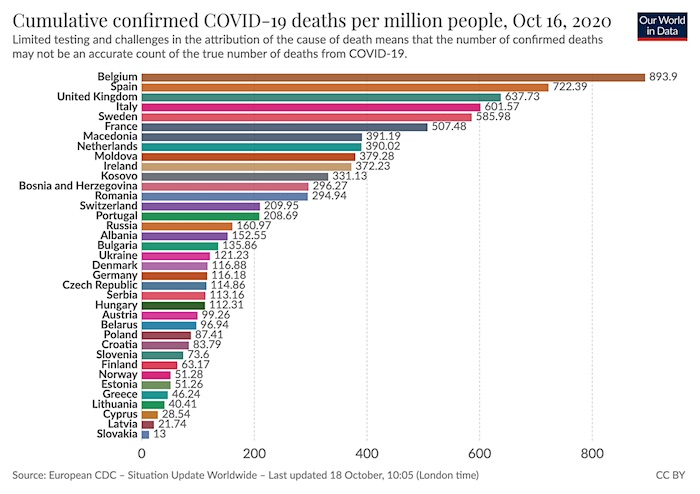
Pablo Picasso Self portrait 1907

Yaneer Europe
Europe is still experiencing exponential growth. The continent now averages 145k new cases per day, from 78k two weeks ago. The growth is observed in almost all European countries. Europe has also overtaken North America and Asia to be the continent with the highest daily growth pic.twitter.com/kawBt2BjsV
— Yaneer Bar-Yam (@yaneerbaryam) October 19, 2020

“It’s particularly rich that The New York Times has fixated on the “unverified” excuse, since it’s spent much of the Trump era offering supposed dirt from anonymous sources — which, by definition, makes the info unverifiable.”
• ‘Unverified’ Is A (False) Excuse For Ignoring NYP’s Hunter Biden Scoops (NYP)
Much of the push to ignore The Post’s drop of Hunter Biden’s e-mails centers on the charge that it’s all “unverified.” The claim is more excuse than truth. First, a host of media outlets have now interviewed the computer-repair guy who provided the data at the heart of these exposés — and he’s said exactly what we’ve reported from the start about how the laptop came into his possession. Second, neither Hunter nor Joe Biden has even questioned the fact that the drive is real — they merely dismiss the entire line of questioning, while charging that The Post has an agenda in presenting it to the world.
Third, we’ve published emails and pictures — most of which have nothing to do with Ukraine or China — that contain an extraordinary level of detail. Is that all fabricated? The Biden campaign’s response, notably, is not that an e-mail from a Burisma official thanking Hunter for an introduction to his father isn’t real, it’s that said meeting doesn’t show up on Joe’s “official” schedules. Pressed by Politico, the campaign acknowledged that they couldn’t say for certain if Joe Biden had met him casually. It’s particularly rich that The New York Times has fixated on the “unverified” excuse, since it’s spent much of the Trump era offering supposed dirt from anonymous sources — which, by definition, makes the info unverifiable.
A simple but striking case of that is The Atlantic’s “reporting” that President Trump spoke contemptuously and insultingly of US troops during his trip to France for war-memorial ceremonies. Its claims were based purely on anonymous sources — but contradicted by a number of on-the-record sources, including ex-National Security Adviser John Bolton, who has absolutely no reason to lie to protect the man who fired him.
Biden drops out
Flashback: Biden drops out in the 1980s
Some Democrats are hoping it will happen again pic.twitter.com/QiaGyqRXb1— James Hirsen (@thejimjams) October 19, 2020

His recent arrest makes him seem even more compromised.
• Steve Bannon Behind ‘Roll-Out Plan’ For Hunter Biden Emails (ZH)
As former Breitbart journalist Lee Stranahan – who’s not exactly Bannon’s biggest fan – puts it, “I can’t think of a single example of him saying he had the goods on the story that didn’t pan out,” adding “If he says a lot more is coming he’s not shooting blanks.” [..] Last week the NY Post took the political world by storm with its release of shocking material from Hunter Biden’s hard drive indicating corruption, sexual depravity, and more. The Post reported that a lawyer for former NY Mayor Rudy Giuliani obtained the hard drive from a computer repairman and that former White House Chief Strategist Steve Bannon had alerted the Post to the existence of the hard drive in July.
“But before turning over the gear, the shop owner says, he made a copy of the hard drive and later gave it to former Mayor Rudy Giuliani’s lawyer, Robert Costello. Steve Bannon, former adviser to President Trump, told The Post about the existence of the hard drive in late September and Giuliani provided The Post with a copy of it on Sunday”. [NY Post] Steve Bannon has since clarified to Revolver News that he was brought into the project based on familiarity with corruption in corporate America, on Wall Street, and within the Chinese Communist Party and America’s political class. Mr. Bannon revealed that he “worked up and executed the roll out plan” of the information contained in the Hunter hard drives. Given his close knowledge and familiarity with an issue of such explosive importance to the election, Revolver asked Mr. Bannon a few questions pertaining to the contents of Hunter’s hard drive and the political implications of their release.
Revolver: What is the most incriminating thing on the hard drive? Rudy has suggested illegal things, and as Revolver reported, the FBI person tasked with the hard drive is associated with the child pornography division. Could you give more insight into how bad it is we’re talking about? Mr. Bannon: Joe Biden is a liar, a fraud, and compromised by Chinese cash. In short, he is a national security crisis. The hard drive combines emails and text messages that show a massive involvement with companies controlled by the Chinese Communist Party. Also, there are 25,000 images that show a drug-addled, depraved lifestyle — one that decent hardworking Americans will not want near the White House.
Revolver: The FBI has been holding onto the hard drive for almost a year? Any sense of why? Was there any indication that they were seriously interested in a criminal case, assuming that there is, in fact, illegal material on there? If not, why would the FBI simply hold onto information like that? Mr. Bannon: The President must confront the director of the FBI on why the information housed on this hard drive was not moved on immediately. If the content of the hard drive had been released when received in November 2019, there would have been no impeachment of Trump, and Bernie Sanders would be the Democratic Party nominee. This confrontation should take place this weekend in the Oval Office. If Wray doesn’t have a bulletproof reason he should be fired in the room.
Revolver: What are your best estimates on how many foreign entities may have obtained possession of the hard drive? Chinese intel? Mr. Bannon: It’s the actions represented on the hard drive that the American people must understand our enemies know about. The cash and equity given for access to Biden, the favors done for that cash, the drugs, the depravity. The CCP, Russian Intel, the Iranian Revolutionary Guard Intel Services — they know the Bidens are for sale. [..] The Bidens are about to be hit with multiple stories from multiple media sources based off evidence beyond the hard drive. Fox and Peter Schweitzer have already started but bigger more mainstream companies are going to weigh in. We already have set in motion the various apparatuses that will release everything.

If there’s one thing we’ve found out the past week it’s a whole new set of revolving doors exist.
• Does This Explain Why Facebook Suppressed Hunter Biden Revelations? (AT)
The moment the New York Post reported on some of the sleazy, corrupt details contained on Hunter Biden’s hard drive, Twitter and Facebook, the social media giants most closely connected to the way Americans exchange political information, went into overdrive to suppress the information and protect Joe Biden. In the case of Facebook, though, perhaps one of those protectors was, in fact, protecting herself. The person currently in charge of Facebook’s election integrity program is Anna Makanju. That name probably doesn’t mean a lot to you, but it should mean a lot – and in a comforting way — to Joe Biden. Before ending up at Facebook, Makanju was a nonresident Senior Fellow at the Atlantic Council. The Atlantic Council is an ostensibly non-partisan think tank that deals with international affairs. In fact, it’s a decidedly partisan organization.
In 2009, James L. Jones, the Atlantic Council’s chairman left the organization to be President Obama’s National Security Advisor. Susan Rice, Richard Holbrooke, Eric Shinseki, Anne-Marie Slaughter, Chuck Hagel, and Brent Scowcroft also were all affiliated with the Atlantic Council before they ended up in the Obama administration. The Atlantic Council has received massive amounts of foreign funding over the years. Here’s one that should interest everyone: Burisma Holdings donated $300,000 dollars to the Atlantic Council, over the course of three consecutive years, beginning in 2016. The information below may explain why it began paying that money to the Council. Not only was the Atlantic Council sending people into the Obama-Biden administration, but it was also serving as an outside advisor. And that gets us back to Anna Makanju, the person heading Facebook’s misleadingly titled “election integrity program.”
Makanju also worked at the Atlantic Council. The following is the relevant part of Makanju’s professional bio from her page at the Atlantic Council: “Anna Makanju is a nonresident senior fellow with the Transatlantic Security Initiative. She is a public policy and legal expert working at Facebook, where she leads efforts to ensure election integrity on the platform. Previously, she was the special policy adviser for Europe and Eurasia to former US Vice President Joe Biden, senior policy adviser to Ambassador Samantha Power at the United States Mission to the United Nations, director for Russia at the National Security Council, and the chief of staff for European and NATO Policy in the Office of the Secretary of Defense. She has also taught at the Woodrow Wilson School at Princeton University and worked as a consultant to a leading company focused on space technologies.”
[..] on the same day in February 2016 that then-Ukrainian President Poroshenko announced that Shokin had offered his resignation, Biden spoke to both Poroshenko and Prime Minister Arseniy Yatsenyuk. The White House version is that Biden gave both men pep talks about reforming the government and fighting corruption. And that’s where Makanju comes in: “Anna Makanju, Biden’s senior policy adviser for Ukraine at the time, also listened to the calls and said release of the transcripts would only strengthen Biden’s case that he acted properly. She helped Biden prepare for the conversations and said they operated at a high level, with Biden using language such as Poroshenko’s government being “nation builders for a transformation of Ukraine.”


Not sure if this enhances the story or kills it.
• Ukrainian Lawmaker: 2nd Laptop Related To Hunter Biden Seized By Law Enforcement (DM)
A Ukrainian lawmaker has claimed a second laptop belonging to Hunter Biden’s business contacts in the country has been seized by law enforcement there. Andrii Derkach posted to Facebook on Friday to say there is a ‘second laptop’ involving evidence of corruption and connected to the Bidens, The Daily Beast reports. Rudy Giuliani, the president’s personal lawyer, has said foreign sources did not provide the Hunter Biden emails first reported last week. He says a laptop containing the correspondence and intimate photos was simply abandoned in a Delaware repair shop and the shop owner reached out to Giuliani’s lawyer. Derkach is one of Giuliani’s principal contacts and was mentioned in an August intelligence assessment that described a concerted Russian effort to disparage Biden.
A Treasury Department sanction announcement from last month characterized Derkach as an ‘active Russian agent for over a decade.’ Now he claims to know of a second laptop, used by ‘two representatives for the interests of [Burisma founder Mykola] Zlochevsky.’ Hunter served on the board of directors at Ukrainian energy company Burisma. In the post Derkach says that laptop ‘was given to Ukrainian law enforcement’ and that Burisma representatives were now serving as ‘witnesses in criminal proceedings.’ The Ukrainian parliamentarian said: ‘The facts that confirm international corruption are stored on the second laptop. ‘This laptop was handed over to Ukrainian law enforcement officers, and the “workers” themselves are now witnesses in criminal proceedings.’
Derkach says the workers are ‘ready to tell’ about international corruption involving the Bidens. He warns: ‘But most importantly! These are not the last witnesses or the last laptop.’ Giuliani has not been shy about discussing his foreign contacts, including with Derkach. In December, Derkach posted on his Facebook page photos of him and Giuliani meeting in Kyiv.

Panic sells.
• How Hysterical Punditry Failed America (Tracey)
It seems like only yesterday that America’s leading organs of elite consensus were engulfed by a full-fledged panic that the country was on the cusp of all-out Civil War. The means by which this prophesied conflict would be instigated — much less fought — were never made exactly clear, but that wasn’t the point. After all, logistical or operational specifics are immaterial when it’s already been ordained that something unimaginably, harrowingly catastrophic is just around the corner. “This is not a drill. The Reichstag is burning,” blared a five-alarm-fire warning in the Washington Post by Dana Milbank, who may want to consider a title change from “columnist” to “in-house hysteric”. Not to be outdone, establishment weather-vane Thomas Friedman joined the fray in the New York Times with an equally shocking exhortation: “I can’t say this any more clearly,” he hyperventilated.
“Our democracy is in terrible danger — more danger than it has been since the Civil War, more danger than after Pearl Harbor, more danger than during the Cuban missile crisis […]”. If these fevered prognostications even bore the faintest resemblance to political conditions in the United States, it might seem a bit odd that the pundits in question have since moved on to other subjects. Or to put it this way: if they really believed their own fantastical rhetoric, shouldn’t they have spent the past few weeks taking action more tangible than rattling off a few throwaway columns and browsing Twitter? Not that any “resistance” brigade composed of pallid middle-aged journalists would be especially formidable on the battlefield, but the point is that their conduct doesn’t come anywhere close to matching the incredible alarmism of their words.
More destruction could be in store next month than was wrought in World War II, the most devastating global military conflict in human history? All of civilisation was nearly wiped out in the Cuban Missile Crisis, but we’re supposed to believe that whatever harm is brought about by the election aftermath will exceed that? If so, why aren’t these people stockpiling canned food and training for hand-to-hand combat? They’re not doing anything of the sort because this latest round of histrionics is just a continuation of a theme that has characterised the Trump era: political and cultural elites, whose psyches have been profoundly damaged, will churn out nonstop waves of hysteria rarely noting afterwards if their frenzied forecasts ever panned out.

I basically see only people doubting these numbers.
• China Says Its Economy Grew 4.9% In The Third Quarter (CNBC)
China’s economy recovered further from the coronavirus in the third quarter, according to data released Monday by the National Bureau of Statistics. The world’s second-largest economy reported third-quarter GDP growth on the low end of expectations, up 4.9% from a year ago. That brings growth for the first three quarters of the year to 0.7% from a year ago. Chinese economists expected GDP growth of 5.2% in the third quarter, according to an average of estimates compiled by Wind Information, a financial information database. Slower recovery in Chinese consumption remained a drag, while uncertainty persisted about the ability of other countries to control the coronavirus pandemic and return to economic growth.
“Generally speaking, the overall national economy continued the steady recovery and significant results have been delivered in coordinating epidemic prevention and development,” the bureau said in an English-language release. “However, we should also be aware that the international environment is still complicated and severe,” the release said, “with considerable instabilities and uncertainties, and that we are under great pressure of forestalling epidemic transmissions from abroad and its resurgence at home. The economy is still in the process of recovery and the foundation for sustained recovery needs to be consolidated.”

This one is easy: China is overproducing once again, that makes the “recovery” look real. But consumption doesn’t follow production.
• China’s Inflation Struggles To Perk Up Despite Broader Recovery (R.)
China’s factory gate prices fell at a faster-than-expected pace in September and consumer inflation slowed to its weakest in 19 months, underscoring the challenges still facing China as it recovers from the COVID-19 pandemic. The producer price index (PPI) fell for an eighth straight month on an annual basis while consumer prices grew more slowly than expected. The world’s second largest economy has seen a steady recovery after being hard hit by the coronavirus in the first quarter. But a sustained fall in producer prices, seen as a gauge of industrial demand, may rekindle worries about deflation and prompt authorities to provide more support, analysts said.
“The PPI has not rebounded strongly despite the improving trend, pointing to continued weakness in industrial demand. It is unlikely to return to positive territory this year,” said Wang Jun, chief economist at Zhongyuan Bank. “It is possible that the economic recovery in the fourth quarter may not be as strong as it has been in the third quarter.” The PPI fell 2.1% from a year earlier, the National Bureau of Statistics (NBS) said in a statement. [..] China’s GDP grew 3.2% year-on-year in the second quarter, and recent data has pointed to a sustained rebound, underpinned by government stimulus and as the virus comes under control. China releases GDP data for the third quarter on Monday.

“..the autumn surge in infections had changed they way they understood the virus..”
• Sweden To Bring In Local Lockdowns As Covid Cases Rise (Sun)
SWEDEN is set to introduce local restrictions as coronavirus cases begin to rise across the country after it shunned lockdown. The nation has been championed by lockdown sceptics as a display of how governments could weather the pandemic storm without using draconian measures. Restaurants, bars and shops stayed open in the spring as many countries shut down their economy – but the now Stockholm appears to be changing its tactics. Dr Johan Nojd, who leads the infectious diseases department in Uppsala, told The Telegraph, said: “It’s more of a lockdown situation – but a local lockdown. He is due to meet with Sweden’s leading health officials on Monday to discussing implementing the new coronavirus measures.
Rules suggested being introduced include telling people to stop meeting the vulnerable and urged to avoid public transport. Dr Nojd also said that if contact tracing shows further links between activities and infections they will not hesitate to impose even tougher measures. He added: “Perhaps tomorrow we will have several talking about concerts or restaurants and then perhaps one could say, ‘in Uppsala now for two or three weeks it is the Public Health Agency’s advice not to sit in restaurants late at night’.” Sweden – which has a population of 10million, only slighter bigger than London – has seen coronavirus cases creeping up since the middle of September. A two week total of 85 cases per 100,000 people has been reported by the European Centre for Disease Prevention and Control. The organisation has marked Sweden with an “orange” alert as they called for coordinated action by European nations to stop a surge in cases.
[..] Sweden’s state epidemiologist Anders Tegnell said on Thursday that the autumn surge in infections had changed they way they understood the virus. He said: “I think the obvious conclusion is that the level of immunity in those cities is not at all as high as we have, as maybe some people, have believed,” he said. “I think what we are seeing is very much a consequence of the very heterogeneous spread that this disease has, which means that even if you feel like there have been a lot of cases in some big cities, there are still huge pockets of people who have not been affected yet.”


Does anyone know of a -truly- successful contact tracing scheme? Did it work in New Zealand? The problem is obvious here: people don’t remember what they did for the past 14 days.
• Alberta’s Contact Tracing Raises Red Flags (CBC)
COVID-19 cases are rising in Alberta, and there are concerns that difficulties involved in contact tracing — both manual and digital — could hamper the province’s ability to slow the spread. Of the 1,812 new cases reported in Alberta last week, 772 (43 per cent) have an unknown source. There are currently 2,836 active cases in the province, 1,054 (37 per cent) from an unknown source. Dr. Lynora Saxinger, an infectious disease specialist at the University of Alberta in Edmonton, said she doesn’t like the look of those numbers. “This is actually one of the cornerstones of reducing spread. If we can’t, basically, kind of find the ring of exposed people and prevent them from spreading it outwards, we’re going to be looking at really, really bad numbers. So it’s a big deal,” she said.
Contact tracing is the process of identifying, notifying and tracking the spread of the virus from individual to individual. Alberta’s team of contact tracers speak to people who have tested positive in order to identify who they have been in close contact with during the previous 14 days. Those close contacts can then be instructed to self-isolate and get tested. Lori Henneigh, acting manager with an Alberta Health Services COVID-19 outbreak team in Red Deer, Alta., told CBC News last month that people often have difficulty remembering what they did 14 days ago. “If you think about it yourself, if you try to think about what you did in the last 14 days, you’ll realize that it’s not easy to recollect what you did two weeks prior,” she said. “We certainly can ask them to look at statements — bills, receipts and things they have at home — to help them remember their activities in the last 14 days.”

Peter Schiff.
• The Day The International Tax Authorities Came Knocking (Age)
On a sunny Friday in late January, investigators from the Australian Tax Office issued subpoenas and fired off letters as part of an unprecedented probe that reached around the world.It was a similar scene in Amsterdam, where investigators from the Dutch tax agency set about a similar task. So, too, did investigators in the United States, Canada and the United Kingdom. While none of the millionaire tax dodgers targeted on January 24, including about 100 Australians, knew each other, they shared a bond: they were customers of a little-known Caribbean bank. The Euro Pacific Bank in Puerto Rico’s capital San Juan was founded by American celebrity investor and business commentator Peter Schiff.
The silver-haired and pugnacious businessman is worth an estimated $100 million. On major television networks, popular podcasts and his own YouTube channel, he reminds his audience he predicted the Global Financial Crisis. He also likes to warn people about the upcoming economic apocalypse from which they can take financial refuge in his “privacy assured” bank. Schiff’s celebrity status is likely why some major Australian financial institutions, including Westpac and the Perth Mint, hopped into bed with the Euro Pacific Bank. They weren’t alone. The New York Federal Reserve and Canada’s Bank of Montreal both allowed their customers to transfer funds into the bank, cloaking it in an air of credibility it used to attract thousands of clients, including at least 400 from Australia (about 100 are considered “high risk”).
But on January 24, Euro Pacific became the target of Operation Atlantis, the world’s largest tax evasion probe. Australia’s deputy tax commissioner, Will Day, describes the inquiry as “unprecedented”. An investigation by The Age, The Sydney Morning Herald and 60 Minutes in collaboration with The New York Times can reveal that Operation Atlantis is examining the financial transactions of Euro Pacific’s customers. Hundreds of account holders are now suspects in a tax evasion probe.
[..] It was January 2017, almost three years to the day before the ATO began knocking on doors, when Schiff and partner Mark Anderson filed into the Department de Estado – a pale-blue Spanish colonial-style building with two Puerto Rican flags adorning the front entrance — to sign documents registering their new venture. The bank’s new office is on the 10th floor of a blue-glass block that overlooks the North Atlantic Ocean. It’s in the expensive part of San Juan. But former employees speaking on the condition anonymity say the office was a bit like the bank itself. “An empty shell that has the appearance of luxury,” according to one Puerto Rican who worked there. “It was basically empty except for a few desks, chairs and the computers.”
When it opened in San Juan, Euro Pacific was one of 81 offshore banks on the island and it would become by far the biggest. Government records from the time of registration show the bank had 13,000 customer accounts and more than $232 million in deposits. Schiff himself lives there with all the trappings of colonial luxury.

Probably a good movie.
• Social Media Creators Admit It Dehumanizes People, Disrupts Social Fabric (RT)
An important new Netflix documentary, The Social Dilemma, uses former Silicon Valley insiders to lay bare the existential threat Big Tech poses to civilization. It’s much more than a dilemma. The Social Dilemma is a remarkable documentary about social media platforms and their two billion users, and may well be the most important documentary made in America for decades. The documentary is a radical, insider-based critique of social media and the large tech companies that created it – and continue to profit handsomely from it (especially given that they are monopolies and pay little or no tax in many countries).
Directed by American filmmaker Jeff Orlowski, The Social Dilemma features interviews with a number of former tech giant executives who created the technologies and business model that underpin the social media empire. Social media has only been with us for just over ten years and most of the interviewees are in their thirties. Tristan Harris (a former Google design ethicist) and Jaron Lanier (a computer scientist) – two of the interviewees – both believe that social media and the tech leviathans have created an “existential threat” to those western societies in which they have been permitted to flourish unchecked. They believe that social media platforms dehumanize their customers, disrupt the social fabric and are destroying democracy.
The critique is all the more compelling because it is perhaps only social media and big tech insiders that have a comprehensive understanding of how the system was created and operates. Technological changes have always attracted criticism. Gustave Flaubert, the nineteenth century novelist, disliked railways because he took the view that they “permitted more people to move about, meet and be stupid together.” But this documentary is much more than a simple critique of one particular technological advance. Rather, Orlowski argues that the technology underpinning social media differs qualitatively from all earlier technological developments, and that this gives rise to serious social and political consequences.
Railways, for example, were a mere “tool” that enabled people to travel more widely – they did not dehumanize their customers; nor were they an existential threat to western society. This qualitative difference, the documentary argues, is a result of the unique technology and business model employed by the social media behemoths. According to Orlowski, the technology utilized by social media is inherently addictive and manipulative, and involves a wide-ranging surveillance of its customers of a kind previously unimaginable.
[..] Many users of social media are undoubtedly addicted to it – observe the compulsive way in which people use their phones in public. And, as the documentary points out, there are only two industries that describe their customers as “users,” the tech industry and the drug industry. Social media is clearly manipulative. Excessive use is encouraged by various “growth techniques” such as tagging photos and inviting friends. The tech giants are in constant contact with their users, bombarding them with information tailored to suit their prejudices, together with endless advertisements. Algorithms enable the extraordinarily precise targeting of users. And there is no doubt that social media engages in covert, wide-ranging and ongoing surveillance of users.
Every transaction, click and post of every user is monitored, and mountains of data are accumulated daily in underground computer vaults in Silicon Valley. Some years ago, author John Lanchester noted that “Facebook is the biggest surveillance-based enterprise in the history of mankind….what Facebook does is watch you, and then use what it knows about you and your behaviour to sell ads.” This brings us to the social media business model. By monitoring their users, the big tech companies accumulate vast amounts of data that enables them to attract advertisers – who are willing to pay large sums for the precise targeting that only the tech giants can provide. This is why advertisers have turned their backs on traditional media companies – who simply cannot offer them the same degree of precision targeting.
In effect, the tech behemoths sell the lives of their users to their advertisers – who are willing to pay billions of dollars for them. In just under 20 years, the tech giants have become the largest corporations in America, and they grow more prosperous by the day.

We try to run the Automatic Earth on donations. Since ad revenue has collapsed, you are now not just a reader, but an integral part of the process that builds this site.
Click at the top of the sidebars for Paypal and Patreon donations. Thank you for your support.





Support the Automatic Earth in virustime, election time, all the time. Click at the top of the sidebars to donate with Paypal and Patreon.







